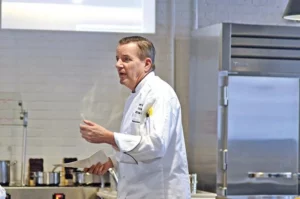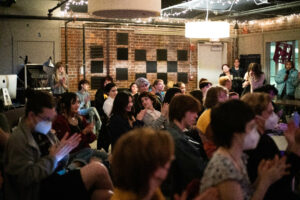
On Wednesday October 25th, I attended the Graduate School Panel hosted in the CAPA symposium alongside fellow students across undergraduate term-standing. Among the faculty and alumni panelists were Jenny Boully (MFA in poetry, Notre Dame and PhD in English, CUNY), Mariam Rahmani (MFA in Fiction, Columbia and PhD in Comparative Literature, UCLA), Sandra Simonds (MFA in Poetry, University of Montana and PhD in Creative Writing, Florida State University), Franny Choi (MFA in Poetry, University of Michigan), Josephine Gawtry ‘23 (MFA in Poetry, Colorado State University) and Zubair Siddiqui ‘20 (MFA in Poetry, University of Iowa Writers’ Workshop).
The panelists each spoke about their individual experiences at graduate school in various program types (PhD, MFA, low-residency MFA) and what their involvement was in coursework, exams, and teaching. A common thread throughout the discussion was choosing to pursue an MFA for the time, space, and financial support to spend on writing.
This is a similar sentiment I heard from current Bennington students thinking about pursuing graduate school. Anna Grace ‘26 said, “I’m going to apply to grad school as an opportunity to write, get feedback, and hone my craft.” This aspect of attending graduate school for the purpose of having more time to dedicate oneself to their craft is unique to the MFA experience. Graduate programs in other disciplines are often geared towards having more credibility or certification in a specific field, rather than improving and sharpening one’s craft.
Mariam Rahmani discussed the doubts associated with attending graduate school, such as not being able to find a job outside of academia, and the danger of one’s “style being stifled.” However, Jenny Boully had an accurate quote that has stuck with me in terms of graduate school and my own undergraduate time at Bennington. Jenny said that in The Vampire Lestat, Anne Rice writes, ““None of us really changes over time. We only become more fully what we are.” The idea of becoming more of who you really are was the driving force behind Jenny’s decision and advice to attend grad school.
Zubair Suddiqui ‘20 gave similar advice when the panelist answered a question from the audience about choosing the right graduate program for yourself. Zubair recommended that you consider the philosophy of the program, the funding, the location, and ultimately whether you think you would be happy there. Josephine ‘23 also recommended that you pursue a program that prioritizes you and your interests, and sees you as an individual.
Compared to other disciplines, there is no program like an MFA in fiction or poetry that is so devoted to the honing of one’s craft. In the literary world, it is important to have dedicated such time to the analysis, creation, and discussion of literature.
As a current senior at Bennington, it is both exhilarating and terrifying to be close to graduation and the dreaded ‘post-grad.’ For years I have watched YouTube vlogs of people who are documenting their time after graduation, and everything seems to come so easily to them: traveling the world, having a complete and aesthetic fashion sense, going to expensive restaurants with friends, maybe finding a job but if they do it is the perfect job tailored to them and if not they are not concerned with finding one. Rarely have I seen someone document an extremely negative, anxious, or unsure period of their life post-undergraduate or during graduate studies. My own undetermined feelings seem to have no space in a post-graduate bliss.
This is intertwined with my younger self’s intimidation towards ‘grown-ups’ who appeared to me to know everything about the world that I would never have guessed or known to even exist. They knew things like taxes and banking and driving and how to store leftover food and how to use Tide pods without them getting stuck in the miniscule space between the body of the washing machine and the inside of the door (as has happened to me a number of times). The grown-ups never seemed, to me, to struggle with knowing what they want to do or who they want to be. They emerged fully formed ahead of me, without any shifting or evolution.
In this space of anxiety, the question of whether to go to grad school or not becomes less a question of obtaining the qualifications needed for my desired career path than it is a question of how, when, and where I want to expand my own creative energy and in what capacity. After the years of undergraduate, it can feel draining and burnout-causing to immediately be considering and moving on to another level of education.
For some students, graduate school is not the answer. Nece ‘25 says, “I’m not pursuing grad school because I want to pursue work immediately out of college.” During the panel, Zubair also advised to take a break and experience the world “outside of academia” to reinforce your love for what you’re doing, and “if you don’t feel love for what you’re doing, question why you’re doing it.”
Other students consider career advancement outside of literature. Holland ‘26 describes, “I want to work in archives or a museum sector. You don’t necessarily need a graduate degree to work in a museum, but a literature degree helps. I want to advance my career more than anything.” Many of the grad school panelists pointed toward academia as an eventual career destination from an MFA or PhD, and when asked what other careers would be available, they suggested editorial work or copywriting, but emphasized the frequency and ease of entering academia in a capacity.
The panel provided more helpful advice: talk to recent graduates from the programs you’re interested in, go somewhere you want to live, don’t choose a program based on faculty. Franny said, “Don’t go into an MFA looking for the reason why you write.” Graduate students should be coming from a place of thorough intention and conviction, which causes more anxiety when the decision is unclear.
In thinking about higher education, I return to a comment that I heard from a professor outside of Bennington who briefly attended Yale Law School. He said that “the best part was the acceptance letter,” which has remained in my mind as a meter of determining if the education I am pursuing and deciding on is really right for me or if it is just the idea of what it represents, as in a validation of my capabilities as a writer.
For Nicole ‘23.5, “I’m applying to MFA programs to study poetry next fall. I want to go to grad school to improve my craft and keep writing, which is what I love and what I’m passionate about.” The overarching hope portrayed by the panelists, and which I believe, is that one’s pursuit of an MFA should be propelled by a love and passion for creative work. To not only want to study writing as an undergraduate, but to want to keep writing and continue the practice of analysis and creation is unique but felt by many Bennington students.
I have talked to other students graduating after the fall and the spring terms, and they concur that the discussion of graduate school is nuanced and leads out into the Greater Unknown of post-graduate life, in which the identity of student is disrupted by the responsibilities of adulthood. On a final note, I return to Jenny Boully’s quote from Anne Rice, and the idea of becoming more of who you really are. My personal relationship with graduate school is evolving as I learn and reflect more. I am planning to take time off after graduation to work and save money, but more importantly, to know myself more outside of a ‘student’ mode, to see what craft I want to produce beyond assignments, and to know where I want further literature study to lead me.





Be First to Comment